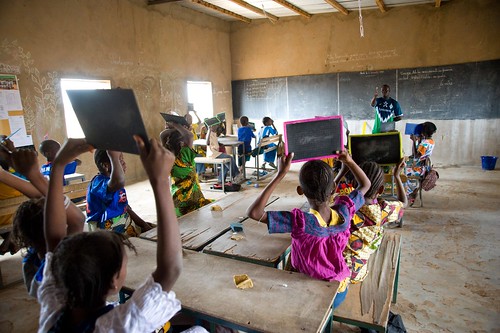
USDA’s Foreign Agricultural Service (FAS) partners with a variety of non-profit groups, cooperatives and international organizations to promote food security in developing countries around the world. The following guest blog highlights the successful partnership between FAS and Counterpart International in Senegal.
More than 25,000 at-risk pre-school and elementary students in Senegal will benefit from a new daily lunch initiative supported by the U.S. Department of Agriculture and implemented by the nonprofit Counterpart International.
The three-year effort, funded via USDA’s McGovern-Dole Food for Education Program, started in March. It provides U.S. bulgur, lentils and vegetable oil, as well as technical assistance and other resources to children in 156 schools in Senegal’s remote province of Matam. The program also provides rations for 1,600 pregnant and lactating women.
“U.S. food will jump-start strong minds and bodies for the children of Matam, and distributing in schools will keep them in school so they can build a future,” says Joan Parker, president and CEO of Counterpart International.
Josephine Trenchard, Counterpart’s director in Senegal, adds: “When people talk about education, most of the time they talk about training teachers. But they ignore the fact that you cannot teach a child who is hungry.”
In addition to supporting school feeding and nutrition projects, the McGovern-Dole program in Senegal seeks to improve overall education standards by training school administrators and constructing classrooms. Parker says that these efforts move families towards long-term self-sufficiency by engaging them in the creation of community gardens and other enterprises that progressively replace donated food with local food.
Senegalese education officials credit these initiatives with increasing enrollment and decreasing dropout rates. Indeed, the government of Senegal has now created a similar program to assist other schools.
The benefits of this food security program can be seen on both sides of the Atlantic, says Parker. “Not only does this program change lives in Senegal, it also supports rural communities in the United States through USDA purchases from American farmers,” says Parker. “It is a win-win situation for everyone involved.”
This latest initiative builds on existing USDA-supported Food for Education programming that Counterpart has implemented in 150 Senegalese schools. More information about Counterpart International and USDA’s joint efforts in Senegal can be found at: http://www.counterpart.org/senegalreport.
By Michael J. Zamba, Senior Director of Communications, Counterpart International
